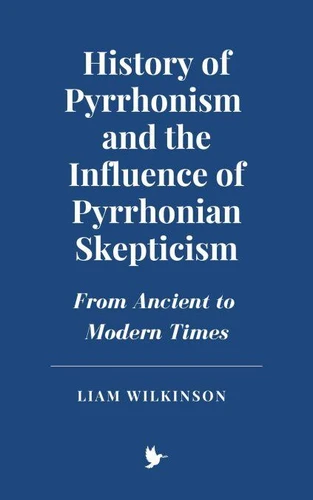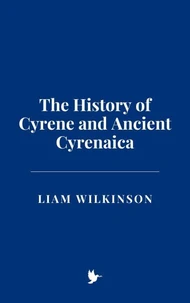History of Pyrrhonism and the Influence of Pyrrhonian Skepticism: From Ancient to Modern Times
Par :Formats :
Disponible dans votre compte client Decitre ou Furet du Nord dès validation de votre commande. Le format ePub est :
- Compatible avec une lecture sur My Vivlio (smartphone, tablette, ordinateur)
- Compatible avec une lecture sur liseuses Vivlio
- Pour les liseuses autres que Vivlio, vous devez utiliser le logiciel Adobe Digital Edition. Non compatible avec la lecture sur les liseuses Kindle, Remarkable et Sony
 , qui est-ce ?
, qui est-ce ?Notre partenaire de plateforme de lecture numérique où vous retrouverez l'ensemble de vos ebooks gratuitement
Pour en savoir plus sur nos ebooks, consultez notre aide en ligne ici
- FormatePub
- ISBN8227200693
- EAN9798227200693
- Date de parution14/10/2024
- Protection num.pas de protection
- Infos supplémentairesepub
- ÉditeurBig Dog Books, LLC
Résumé
This book offers an in-depth exploration of Pyrrhonian skepticism, tracing its development from its origins in ancient Greece through its rediscovery during the Renaissance, and examining its lasting influence on modern and contemporary philosophy. Pyrrhonian skepticism, founded by Pyrrho of Elis and later systematized by Sextus Empiricus, is characterized by its radical suspension of judgment (epoche) and the pursuit of tranquility (ataraxia) through freedom from dogmatic belief. The book begins with an analysis of Pyrrho's foundational ideas and the subsequent elaboration of skepticism by his followers, focusing on how they questioned the possibility of certain knowledge and critiqued the dogmatism of other philosophical schools.
The work then explores how Pyrrhonian skepticism faded in late antiquity as Christianity and Neoplatonism gained prominence, before being revived during the Renaissance through the rediscovery of Sextus Empiricus' writings. Pyrrhonism's impact on Enlightenment thinkers such as David Hume, Immanuel Kant, and Voltaire is examined, particularly in relation to debates about epistemology, science, and religion.
The book also addresses how Pyrrhonian skepticism influenced existentialism and postmodernism in the 19th and 20th centuries, shaping the works of figures like Nietzsche, Kierkegaard, Sartre, and Derrida. In the final chapters, the book reflects on the relevance of Pyrrhonian skepticism in the modern world, particularly in relation to contemporary issues such as the information age, post-truth politics, ethical pluralism, and technological advancement.
The conclusion highlights how Pyrrhonian skepticism, with its emphasis on critical inquiry, intellectual humility, and the suspension of dogma, continues to offer valuable insights for navigating the complexities and uncertainties of 21st-century life. This comprehensive study demonstrates the enduring appeal of Pyrrhonian skepticism as a framework for engaging with knowledge, belief, and truth, and its ongoing relevance for contemporary philosophical and cultural debates.
The work then explores how Pyrrhonian skepticism faded in late antiquity as Christianity and Neoplatonism gained prominence, before being revived during the Renaissance through the rediscovery of Sextus Empiricus' writings. Pyrrhonism's impact on Enlightenment thinkers such as David Hume, Immanuel Kant, and Voltaire is examined, particularly in relation to debates about epistemology, science, and religion.
The book also addresses how Pyrrhonian skepticism influenced existentialism and postmodernism in the 19th and 20th centuries, shaping the works of figures like Nietzsche, Kierkegaard, Sartre, and Derrida. In the final chapters, the book reflects on the relevance of Pyrrhonian skepticism in the modern world, particularly in relation to contemporary issues such as the information age, post-truth politics, ethical pluralism, and technological advancement.
The conclusion highlights how Pyrrhonian skepticism, with its emphasis on critical inquiry, intellectual humility, and the suspension of dogma, continues to offer valuable insights for navigating the complexities and uncertainties of 21st-century life. This comprehensive study demonstrates the enduring appeal of Pyrrhonian skepticism as a framework for engaging with knowledge, belief, and truth, and its ongoing relevance for contemporary philosophical and cultural debates.
This book offers an in-depth exploration of Pyrrhonian skepticism, tracing its development from its origins in ancient Greece through its rediscovery during the Renaissance, and examining its lasting influence on modern and contemporary philosophy. Pyrrhonian skepticism, founded by Pyrrho of Elis and later systematized by Sextus Empiricus, is characterized by its radical suspension of judgment (epoche) and the pursuit of tranquility (ataraxia) through freedom from dogmatic belief. The book begins with an analysis of Pyrrho's foundational ideas and the subsequent elaboration of skepticism by his followers, focusing on how they questioned the possibility of certain knowledge and critiqued the dogmatism of other philosophical schools.
The work then explores how Pyrrhonian skepticism faded in late antiquity as Christianity and Neoplatonism gained prominence, before being revived during the Renaissance through the rediscovery of Sextus Empiricus' writings. Pyrrhonism's impact on Enlightenment thinkers such as David Hume, Immanuel Kant, and Voltaire is examined, particularly in relation to debates about epistemology, science, and religion.
The book also addresses how Pyrrhonian skepticism influenced existentialism and postmodernism in the 19th and 20th centuries, shaping the works of figures like Nietzsche, Kierkegaard, Sartre, and Derrida. In the final chapters, the book reflects on the relevance of Pyrrhonian skepticism in the modern world, particularly in relation to contemporary issues such as the information age, post-truth politics, ethical pluralism, and technological advancement.
The conclusion highlights how Pyrrhonian skepticism, with its emphasis on critical inquiry, intellectual humility, and the suspension of dogma, continues to offer valuable insights for navigating the complexities and uncertainties of 21st-century life. This comprehensive study demonstrates the enduring appeal of Pyrrhonian skepticism as a framework for engaging with knowledge, belief, and truth, and its ongoing relevance for contemporary philosophical and cultural debates.
The work then explores how Pyrrhonian skepticism faded in late antiquity as Christianity and Neoplatonism gained prominence, before being revived during the Renaissance through the rediscovery of Sextus Empiricus' writings. Pyrrhonism's impact on Enlightenment thinkers such as David Hume, Immanuel Kant, and Voltaire is examined, particularly in relation to debates about epistemology, science, and religion.
The book also addresses how Pyrrhonian skepticism influenced existentialism and postmodernism in the 19th and 20th centuries, shaping the works of figures like Nietzsche, Kierkegaard, Sartre, and Derrida. In the final chapters, the book reflects on the relevance of Pyrrhonian skepticism in the modern world, particularly in relation to contemporary issues such as the information age, post-truth politics, ethical pluralism, and technological advancement.
The conclusion highlights how Pyrrhonian skepticism, with its emphasis on critical inquiry, intellectual humility, and the suspension of dogma, continues to offer valuable insights for navigating the complexities and uncertainties of 21st-century life. This comprehensive study demonstrates the enduring appeal of Pyrrhonian skepticism as a framework for engaging with knowledge, belief, and truth, and its ongoing relevance for contemporary philosophical and cultural debates.























